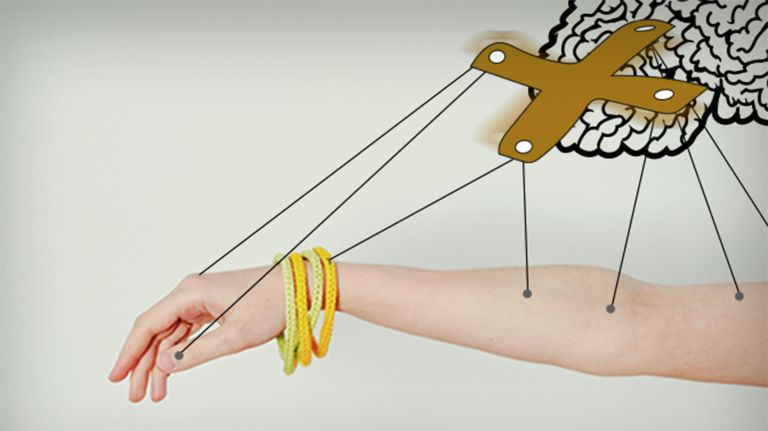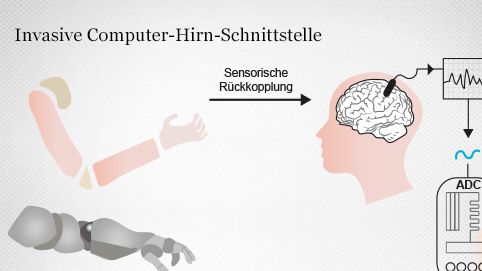Prof. Dr. Andrea Kübler
Dr. rer. nat. (Biologie), Prof. (Psychologie)Frau Prof. Dr. Kübler studierte Biologie an den Universitäten Stuttgart, Würzburg sowie Tübingen und promovierte am Institut für Medizinische Psychologie und Verhaltensneurobiologie an der Universität Tübingen. In ihrer Dissertation beschäftigte sie sich mit dem Thema: ?Brain-computer communication - development of a brain-computer interface for locked-in patients on the basis of the psychophysiological self-regulation training of slow cortical potentials (SCP)?. Nach dem erfolgreichen Abschluss eines sich anschließenden Psychologiestudiums hat sie zum Thema: „Brain-Computer Interfaces - the key for the conscious brain locked into a paralysed body.“ habilitiert. Zurzeit hat sie die Professur für Interventionspsychologie am Lehrstuhl für Psychologie I ? Biologische und Klinische Psychologie an der Universität Würzburg inne.
Arbeitsschwerpunkt:
Computational Neuroscience, Kognitive Neurowissenschaften
Ausbildung:
Diplom-Biologin, Diplom-Psychologin
Abschluss:
Dr. rer. nat. (Biologie), Prof. (Psychologie)
Position / Tätigkeit:
Professur
Homepage:
http://www.i1.psychologie.uni-wuerzburg.de/int/mitarbeiter/kuebler_andrea_prof_dr/
Huggins J. E., Guger Ch., Allison B., Anderson Ch. W., Batista A., Brouwer A-M., Brunner C., Chavarriaga R., Fried-Oken M., Gunduz A., Gupta D., Kübler A., Leeb R., Lotte F., Miller L. E., Müller-Putz G., Rutkowski T., Tangermann M., Thompson D. E. (2014) Workshops of the Fifth International Brain-Computer Interface Meeting: Defining the Future, Brain-Computer Interfaces, 1:1, 27-49.
Kaufmann T., Herweg A., Kübler A. Toward brain-computer interface based wheelchair control utilizing tactually-evoked event-related potentials. J Neuroeng Rehabil. 2014 Jan 16;11(1):7.
Lulé D., Nonnenmacher S., Sorg S., Heimrath J., Hautzinger M., Meyer T., Kübler A., Birbaumer N., Ludolph AC. Live and let die: existential decision processes in a fatal disease. J Neurol. 2014 Jan 12.
Meule A., Lutz AP., Vögele C., Kübler A., Impulsive reactions to food-cues predict subsequent food craving. Eating Behaviors 2014 Jan;15(1):99-105.
Kaufmann T., Herweg A., Kübler A. Toward brain-computer interface based wheelchair control utilizing tactually-evoked event-related potentials. J Neuroeng Rehabil. 2014 Jan 16;11(1):7.
Real RG, Herbert C., Kotchoubey B., Wessig C., Volkmann J., Kübler A. (2013) Psychophysiological correlates of coping and quality of life in patients with ALS. Clin Neurophysiol. 2013 Nov 6.
Meule, A., Kübler, A. and Blechert, J. (2013) Time course of electrocortical food-cue responses during cognitive regulation of craving. Front. Psychol. 4:669.
Kleih SC and Kübler A (2013) Empathy, motivation, and P300-BCI performance. Front. Hum. Neurosci. 7:642.
Kübler A., Zickler C., Holz E., Kaufmann T., Riccio A., Mattia D. Applying the user-centred design to evaluation of Brain-Computer Interface controlled applications. Biomed Tech (Berl). 2013 Sep 7.
Pokorny C., Klobassa DS., Pichler G., Erlbeck H., Real RG., Kübler A., Lesenfants D, Habbal D, Noirhomme Q, Risetti M, Mattia D, Müller-Putz GR.The auditory P300-based single-switch brain-computer interface: Paradigm transition from healthy subjects to minimally conscious patients. Artif Intell Med. 2013 Sep 13: 81-90.
Julius-Maximilians-Universität Würzburg
UniversitätInstitut:
Lehrstuhl für Psychologie I
Arbeitsschwerpunkt:
Computational Neuroscience, Neurowissenschaften Allgemein, Verhaltensneurobiologie
Anschrift:
Marcusstraße 9-11
97070 Würzburg
DE
Telefon:
+49 931 31-80179
E-Mail:
Andrea.Kuebler@uni-wuerzburg.de
Homepage:
http://www.i1.psychologie.uni-wuerzburg.de/int/home/

